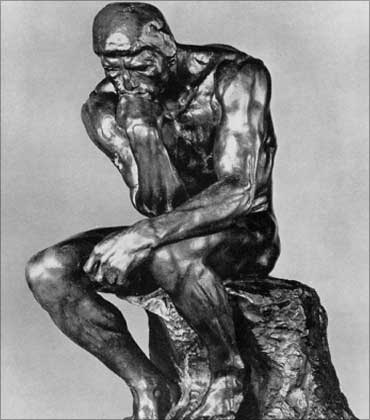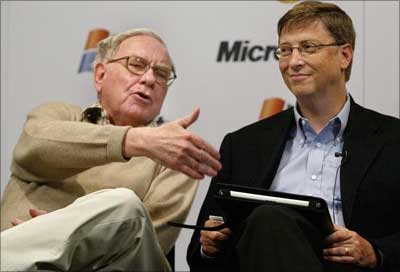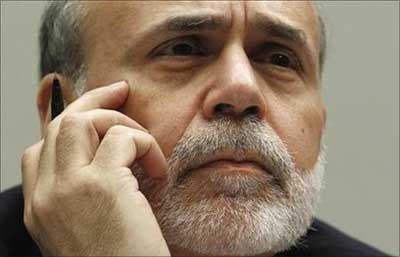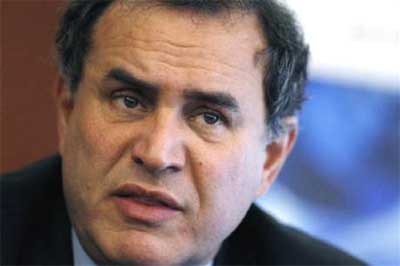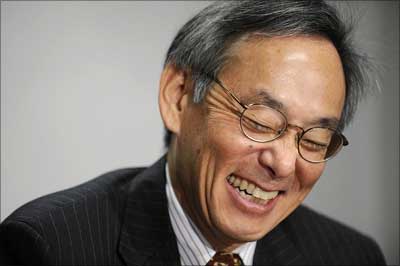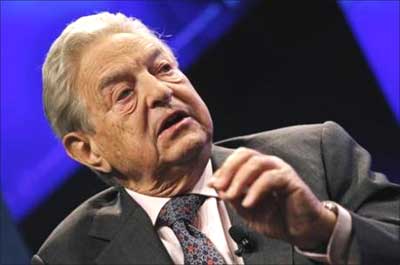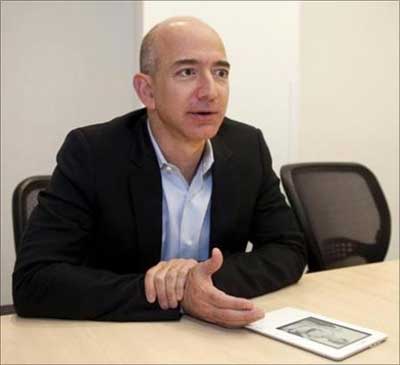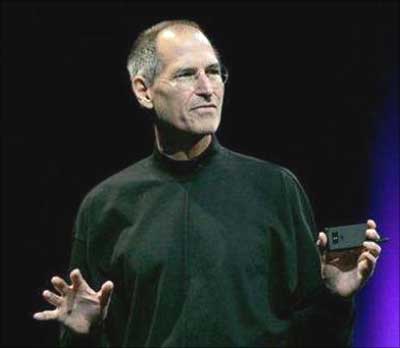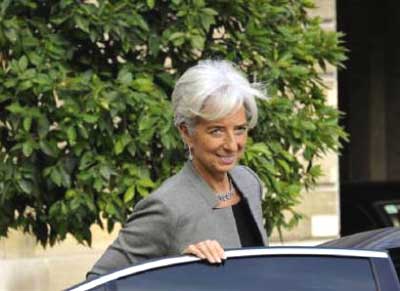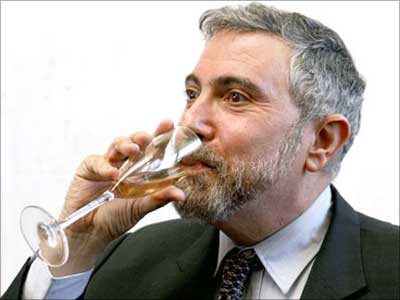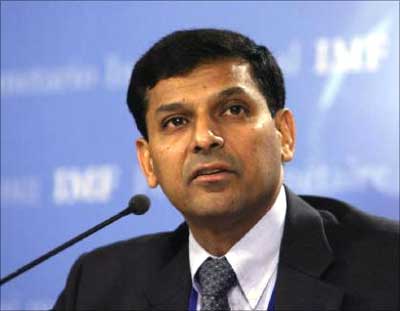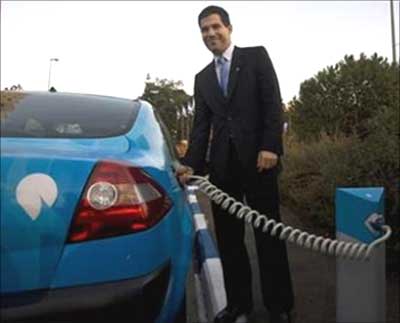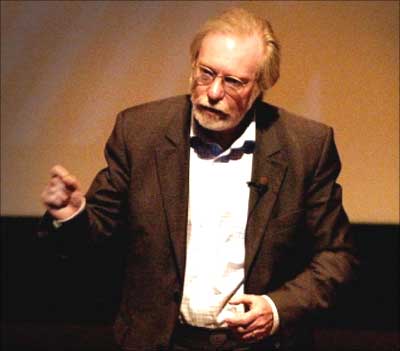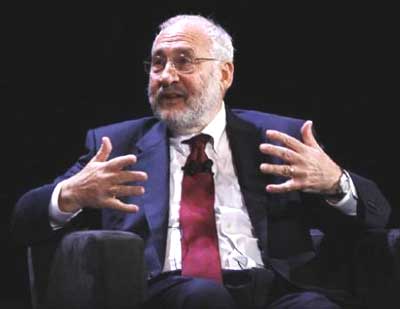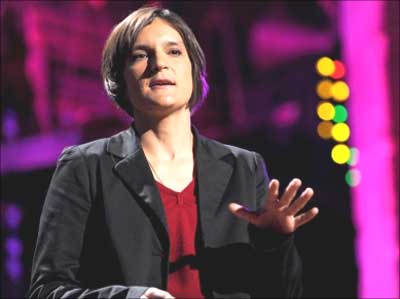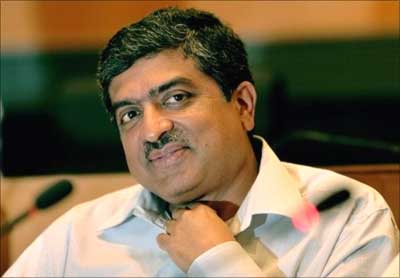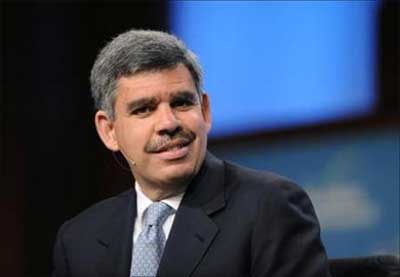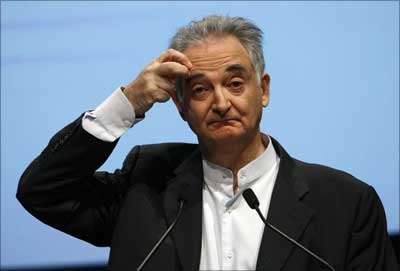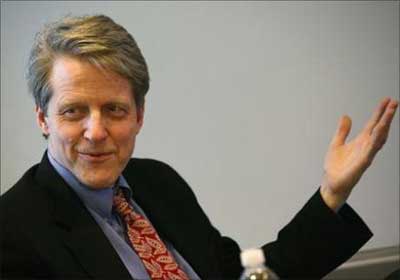 | « Back to article | Print this article |
They dream to change the world for the better
American hegemony over the world is waning and the balance seems to be decisively has shifting towards rising economies like India, China, Brazil and Turkey.
Foreign Policy's second annual list of the Top 100 Global Thinkers fully reflects the new world.
It talks of people who has big dreams to change the world, and change it for the better.
Among the top 50 thinkers, at least twenty people belong to the world of business and economy.
In the following pages we give you a list of the top 50, with special focus on those who are either entrepreneurs, investors or economists.
Click on NEXT to read more...
They dream to change the world for the better
1. Warren Buffet, Chairman, Berkshire Hathaway, and
Bill Gates, Founder, Microsoft Corp
For stepping up as the world's states falter
Their mission is to create a global club of 'Great Givers'.
Two of the world's richest men -- investor Warren Buffett, and Microsoft founder Bill Gates are traversing the world to convince the super rich to donate a part of their wealth to charities.
In 2006, Buffett pledged to give 99 per cent of his assets away to charity -- much of it to Bill and Melinda Gates Foundation.
Gates' Foundation spends more than $2 billion a year on programmes to improve public health with focus on research into microbicides -- gels that would prevent HIV transmission.
From a green revolution for Africa to a vaccine for malaria, their agenda is now global.
Buffett's net worth is estimated to be $47 billion, while Bill Gates is estimated to be worth $54 billion.
Click on NEXT to read more...
They dream to change the world for the better
2. Dominique Strauss-Kahn, MD, International Monetary Fund, and
Robert Zoellick, President, World Bank
For steely vision at a moment of crisis
Dominique Strauss-Kahn's IMF has managed to forestall sovereign defaults in Greece, Hungary, Pakistan, and Ukraine without inspiring much resistance.
The World Bank on its part made heroic efforts to deal with unexpected disasters -- from the floods in Pakistan to the earthquake in Haiti.
Besides it plays pivotal role in combatting global food crisis to climate change.
3. Barack Obama, President, United States of America
For charting a course through criticism.
4. Zhou Xiaochuan, Governor, People's Bank, China
For holding the world's economic fate in his hands.
Click on NEXT to read more...
They dream to change the world for the better
5. Ben Bernanke, Chairman, US Federal Reserve
For owning the US economy, no matter what it takes
Although Bernanke admitted that central bankers alone cannot solve the world's economic problems, he took some bold steps to give more power to the US Fed.
He raised the Fed's balance sheet to $2.3 trillion and pushed tens of billions of that over to the US Treasury to help close the deficit.
6. Celso Amorim, Foreign Minister, Brazil
For transforming Brazil into a global player.
7. Ahmet Davutoglu, Foreign Minister, Turkey
For being the brains behind Turkey's global reawakening.
8. David Petraeus, Commanding US general, Afghanistan
For taking a demotion to save a war.
9. Robert Gates, US Defense secretary
For transforming US military might for the 21st century.
10. Angela Merkel, Chancellor, Germany
For leading Europe through the recession with Teutonic resolve.
11. Michael Bloomberg, Mayor New York, and
Feisal Abdul Rauf, Imam, Cordoba Initiative, New York
For reminding a divided country that Muslims are Americans too.
Click on NEXT to read more...
They dream to change the world for the better
12. Nouriel Roubini, Economist, New York
For seeing the roots of the next crisis in the current one.
Uncharitably called 'Dr Doom', Roubini argues that the United States has a 40 per cent chance of heading back into a recession.
He thinks the root causes of the current malaise have only been covered over and that unhealthy levels of debt are once again piling up around the world.
13. Bill Clinton, Former US President, and
Hillary Rodham Clinton, US Secretary of State
For proving that you don't need to be president to act presidential.
Click on NEXT to read more...
They dream to change the world for the better
14. Steven Chu, US Energy Secretary
For his dogged efforts to keep America innovating.
An American physicist and currently the 12th United States Secretary of Energy, Steven Chu is known for his research at Bell Labs in cooling and trapping of atoms with laser light, which won him a share of the Nobel Prize in Physics in 1997.
At the time of his appointment as Energy Secretary, he was a professor of physics and molecular and cellular biology at the University of California, Berkeley and the director of the Lawrence Berkeley National Laboratory.
He is a vocal advocate for more research into alternative energy and nuclear power.
Click on NEXT to read more...
They dream to change the world for the better
15. George Soros, businessman and philanthropist
For proving it's not what you make that counts -- it's who you give it to.
A Hungarian-American financier, businessman and notable philanthropist focused on supporting liberal ideals and causes, Soros is known as 'the Man Who Broke the Bank of England' after he reportedly earned $1 billion during the 1992 Black Wednesday UK currency crises by shorting the pound.
The noted investor has already donated more than $7 billion of his fortune to charitable causes.
In September he announced that he was bequeathing $100 million to Human Rights Watch -- the largest a human rights group has ever received.
16. Liu Xiaobo, political prisoner, China
For bearing the flame of 1989 into a new generation and also for getting the Nobel Prize for Peace this year.
Click on NEXT to read more...
They dream to change the world for the better
17. Jeff Bezos, CEO, Amazon
For reinventing reading.
Jeffrey Preston 'Jeff' Bezos is the founder, president, chief executive officer and chairman of the board of Amazon.com.
Bezos, a Tau Beta Pi graduate of Princeton University, worked as a financial analyst for D E Shaw & Co before founding Amazon in 1994.
Click on NEXT to read more...
They dream to change the world for the better
17. Steve Jobs, CEO, Apple
For reinventing reading.
Much has been made of Jobs' aggressive and demanding personality.
Fortune wrote that he "is considered one of Silicon Valley's leading egomaniacs."
Jobs has always aspired to position Apple and its products at the forefront of the information technology industry by foreseeing and setting trends, at least in innovation and style.
Jobs once said: "My model for business is the Beatles: They were four guys that kept each other's negative tendencies in heck; they balanced each other.
And the total was greater than the sum of the parts.
Great things in business are not done by one person, they are done by a team of people."
18. Shivshankar Menon, national security advisor, India
For dragging India out of its global nonalignment.
19. Ron Paul, US Congressman
For inspiring the thinking man's Tea Party.
20. Mohamed ElBaradei, democracy activist, Egypt
For proving that there are second acts in public life.
Click on NEXT to read more...
They dream to change the world for the better
21. Sergey Brin and Larry Page, Co-founders, Google
For standing up to China's bullying.
In 1998, Brin and Page founded Google, Inc.
Page ran Google as co-president along with Brin until 2001 when they hired Eric Schmidt as chairman and CEO of Google.
Both Page and Brin earn an annual compensation of one dollar.
Page is an active investor in alternative energy companies, such as Tesla Motors, which developed the Tesla Roadster, a 220-mile (350 km) range battery electric vehicle.
He continues to be committed to renewable energy technology, and with the help of Google.org, Google's philanthropic arm, promotes the adoption of plug-in hybrid electric cars and other alternative energy investments.
Brin and Page are the executive producers of the 2007 film Broken Arrows.
Click on NEXT to read more...
They dream to change the world for the better
22. Christine Lagarde, Finance Minister, France
For pushing France on fiscal discipline.
A noted antitrust and labour lawyer, Lagarde made history as the first female chairman of the international law firm Baker & McKenzie.
On November 16, 2009, The Financial Times ranked her the best minister of Finance of the Eurozone.
23. Salam Fayyad, Prime Minister, Palestine
For bringing faith in technocracy to the Holy Land.
24. Elizabeth Warren, White House advisor
For putting the spotlight on America's debt binge.
25. Henry Kissinger, Sam Nunn, William Perry, and George Shultz
Elder statesmen, New York, Washington, Palo Alto, California
For showing that if wise men can give up on nukes, so can the rest of us.
Click on NEXT to read more...
They dream to change the world for the better
26. Paul Krugman, Economist, Princeton University
For their spirited debate over the roots of the global financial meltdown.
According to the Nobel Prize Committee, the prize was given for Krugman's work explaining the patterns of international trade and the geographic concentration of wealth, by examining the impact of economies of scale and of consumer preferences for diverse goods and services.
Krugman is known in academia for his work on international economics (including trade theory, economic geography, and international finance), liquidity traps and currency crises.
Click on NEXT to read more...
They dream to change the world for the better
26. Raghuram Rajan, Economist, University of Chicago
For their spirited debate over the roots of the global financial meltdown.
Raghuram Govind Rajan is currently the Eric J. Gleacher Distinguished Service Professor of Finance at the Booth School of Business at the University of Chicago.
He is also an honorary economic adviser to Prime Minister Manmohan Singh.
He previously was the chief economist of the International Monetary Fund and headed a committee appointed by the Planning Commission on financial reforms in India.
27. Fareed Zakaria, Editor at large, Time, New York
For chronicling the rise of the rest.
Click on NEXT to read more...
They dream to change the world for the better
28. Shai Agassi, CEO, Better Place, Palo Alto
For driving to make electric cars a reality.
Agassi, president of the Products and Technology Group, resigned from this position on March 28, 2007, to pursue interests in alternative energy and climate change.
In October 2007 he founded a company named Project Better Place, focusing on a green transportation infrastructure based on electric cars as an alternative to the current fossil fuel technology.
In 2003, at the age of 36, Agassi was named one of the top 20 'Global Influentials for 2003' on a CNN-Time Magazine joint list.
Click on NEXT to read more...
They dream to change the world for the better
29. Paul Collier, Economist, Oxford University
For showing that natural resources don't have to be a curse.
Collier is a specialist in the political, economical and developmental predicaments of poor countries.
He was appointed Commander of the Order of the British Empire (CBE) in the 2008 Birthday Honours.
From 1998-2003 he was the director of the Development Research Group of the World Bank.
Click on NEXT to read more...
They dream to change the world for the better
30. Joseph Stiglitz, Economist, Columbia University
For his full-throated defense of fiscal stimulus.
In addition to making numerous influential contributions to microeconomics, Stiglitz has played a number of policy roles.
He served in the Clinton Administration as the chair of the President's Council of Economic Advisors (1995-1997).
At the World Bank, he served as Senior Vice President and Chief Economist (1997-2000), in the time when unprecedented protest against international economic organisations started.
He was fired by the World Bank for expressing dissent with its policies.
He was a lead author for the Intergovernmental Panel on Climate Change.
31. David Cameron, Prime Minister, Britain
For showing what the new politics of austerity really mean.
32. Cecile Duflot, Monica Frassoni, Renate K nast, Marina Silva
Green Party leaders France, Belgium, Germany, Brazil
For taking Green mainstream.
33. Thomas Friedman, Columnist, New York Times
For trying to inspire a new Greatest Generation.
34. John Kerry and Richard Lugar, US Senators
For being the adults on Capitol Hill.
35. Paul Farmer, Medical anthropologist, Harvard University
For showing the world what to do, and what not to do, in Haiti.
36. Michelle Bachelet, Undersecretary-general, UN Women
For applying a stateswoman's vision to gender equality.
37. Martin Wolf, Columnist, Financial Times, Britain
For dishing out the economic advice no one wants to hear.
Click on NEXT to read more...
They dream to change the world for the better
38. Esther Duflo, Economist, MIT
For putting hard numbers to a bleeding-heart pursuit.
Her major research focus is on Development economics, with an emphasis on health, education, gender and politics, and provision of credit.
She was awarded the Elaine Bennett Research Prize by the American Economic Association in 2003.
This prize honors a woman economist under the age of forty who has made outstanding contributions in any field of economic research.
She is currently a co-director of the Abdul Latif Jameel Poverty Action Lab at MIT, and writes a monthly column for Liberation, a French daily.
39. Mohamed Nasheed, President, Maldives
For putting a face -- his own -- on the peril of climate change.
40. Abdolkarim Soroush, Religious scholar, Washington
For driving a stake through the dark heart of Iran's theocracy.
41. Mehdi Karroubi, Cleric, Iran
For keeping the spirit of the Green Movement alive.
42. Agnes Klingshirn, Aid worker, Germany, and
Peter Scott, Stove designer, Seattle
For helping the world breathe easier.
Click on NEXT to read more...
They dream to change the world for the better
43. Nandan Nilekani, Entrepreneur
For proving that India can be not only democratic, but efficient.
He currently serves as the Chairman of the new Unique Identification Authority of India (UIDAI), after a successful career at Infosys Technologies Ltd.
He is also heading Government of India's technology committee called as TAGUP.
44. Zheng Bijian, Geostrategist, China
For trying to keep China's rise peaceful.
Click on NEXT to read more...
They dream to change the world for the better
45. Mohamed El-Erian, CEO, Pimco, Newport Beach, California
For reminding us just how bad things could get.
El-Erian is the CEO and co-CIO of PIMCO, the world's largest bond investor with over US$1 trillion of assets under management as of 2010.
He previously worked as the investment manager of Harvard Management Company, Harvard University's $34.9 billion endowment fund, where he spent almost two years.
46. Kwame Anthony Appiah, Philosopher, Princeton University
For forging a code of ethics to fit a globalised world.
Click on NEXT to read more...
They dream to change the world for the better
47. Jacques Attali, Economic advisor, France
For not letting a crisis go to waste.
In April 1991 he became the first President of the London-based European Bank for Reconstruction and Development, the financial institution established by western governments to assist the countries of eastern and central Europe and the former Soviet Union in their transition to democratic market economies.
He worked at the bank until 1993.
In 1998 Attali founded the French non-profit organization PlaNet Finance which focuses on microfinance.
Click on NEXT to read more...
They dream to change the world for the better
48. Robert Shiller, Economist, Yale University
For bringing economics (and economists) down to earth.
Robert James "Bob" Shiller is an American economist, academic, and best-selling author.
He currently serves as the Arthur M Okun Professor of Economics at Yale University and is a Fellow at the Yale International Center for Finance, Yale School of Management.
Shiller is ranked among the 100 most influential economists of the world.
49. Vaclav Smil, Environmental scientist, University of Manitoba, Canada
For keeping the West honest about its plight.
50. Ashraf Ghani and Clare Lockhart
Co-founders, Institute for State Effectiveness, Afghanistan and Washington
For keeping the focus on governance, not just guns.
Click on NEXT to read more...
